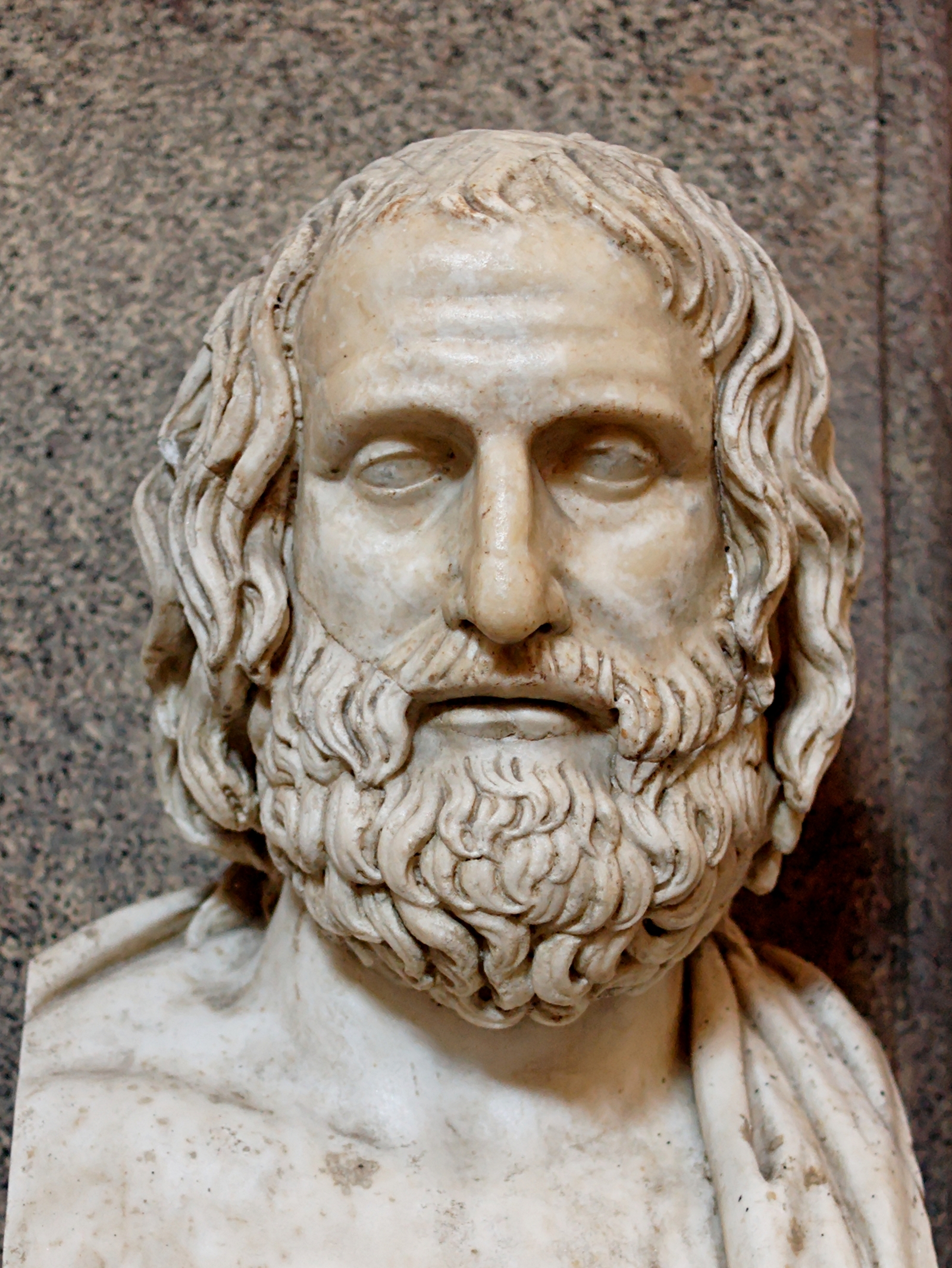Werk
Andromache
EuripidésIphigenie in Aulis
EuripidésEuripidés Berühmte Zitate
Euripidés Zitate und Sprüche
„Die Zeit entlarvt den Bösen.“
Hippolyt 428 / Phädra
Original altgriech.: "Κακοὺς δὲ θνητῶν ἐξέφην' ὅταν τύχῃ."
„Du zählst im Elend keinen Freund.“
Elektra 1131 / Elektra
Original altgriech.: "πένητας οὐδεὶς βούλεται κτᾶσθαι φίλους."
„Ein guter Mann wird stets das Bessre wählen.“
Iphigenie in Aulis, 502f / Menelaus
Original altgriech.: "ἀνδρὸς οὐ κακοῦ τρόποι // τοιοίδε, χρῆσθαι τοῖσι βελτίστοις ἀεί.."
„Ein vorsichtiger ist besser als ein waghalsiger Heerführer.“
Die Phönizierinnen 599 / Polyneikes
Original altgriech.: "ἀσφαλὴς γάρ ἐστ' ἀμείνων ἢ θρασὺς στρατηλάτης."
„Ob einem reiche Totengabe wird zuteil, das ist nur eitle Prahlerei der Lebenden.“
Die Troerinnen 1249f / Hekuba
Original altgriech.: "εἰ πλουσίων τις τεύξεται κτερισμάτων· // κενὸν δὲ γαύρωμ´ ἐστὶ τῶν ζώντων τόδε."
„Sei bei mir, in Maßen zwar, doch verlasse mich nicht.“
über den Wein, gemäß Plutarch Moralia, Vorschriften zur Gesundheit, Kapitel 19
Original altgriech.: "εἴης μοι, μέτριος δέ πως // εἴης μηδ´ ἀπολείποις."
Euripidés: Zitate auf Englisch
“Account no man happy till he dies.”
Sophocles in Oedipus Rex
Variant in Herodotus 1.32: Count no man happy until he is dead.
Misattributed
“When good men die their goodness does not perish,
But lives though they are gone.”
Temenidæ Frag. 734
Kontext: When good men die their goodness does not perish,
But lives though they are gone. As for the bad,
All that was theirs dies and is buried with them.
Bellerophon
Kontext: Doth some one say that there be gods above?
There are not; no, there are not. Let no fool,
Led by the old false fable, thus deceive you.
Look at the facts themselves, yielding my words
No undue credence: for I say that kings
Kill, rob, break oaths, lay cities waste by fraud,
And doing thus are happier than those
Who live calm pious lives day after day. All divinity
Is built-up from our good and evil luck.
“When one with honeyed words but evil mind
Persuades the mob, great woes befall the state.”
Quelle: Orestes (408 BC), l. 907
“This is slavery, not to speak one's thought.”
Variante: Who dares not speak his free thoughts is a slave.
Quelle: The Phoenician Women (c.411-409 BC)
“In case of dissension, never dare to judge till you've heard the other side.”
Heraclidæ (c 428 BC); quoted by Aristophanes in The Wasps
Quelle: The Children of Herakles
“Love is all we have, the only way that each can help the other.”
Quelle: Orestes (408 BC), l. 298, as translated by William Arrowsmith
“Man's most valuable trait
is a judicious sense of what not to believe.”
The Complete Greek Tragedies: Euripides II: Helen. Hecuba. Andromache. The Trojan women. Ion. Rhesus. The suppliant women by David Grene, Richmond Alexander Lattimore (eds.), Modern Library, 1963, p. 73
“Talk sense to a fool and he calls you foolish.”
Bacchæ l. 480
Variant translation: To the fool, he who speaks wisdom will sound foolish.
Variant translation: He were a fool, methinks, who would utter wisdom to a fool. (translated by Edward Philip Coleridge)
Variant translation: Wise words being brought to blinded eyes will seem as things of nought. ( translated by Gilbert Murray http://www.gutenberg.org/files/8418/8418-h/8418-h.htm)
Quelle: The Bacchae
Quelle: Alcestis (438 BC), l. 358
Kontext: Oh, if I had Orpheus' voice and poetry
with which to move the Dark Maid and her Lord,
I'd call you back, dear love, from the world below.
I'd go down there for you. Charon or the grim
King's dog could not prevent me then
from carrying you up into the fields of light.
“The fiercest anger of all, the most incurable,
Is that which rages in the place of dearest love.”
Quelle: Medea and Other Plays: Medea / Alcestis / The Children of Heracles / Hippolytus
Quelle: Medea and Other Plays: Medea / Alcestis / The Children of Heracles / Hippolytus
“Cleverness is not wisdom. And not to think mortal thoughts is to see few days.”
Bacchæ l. 395
Quelle: The Bacchae

